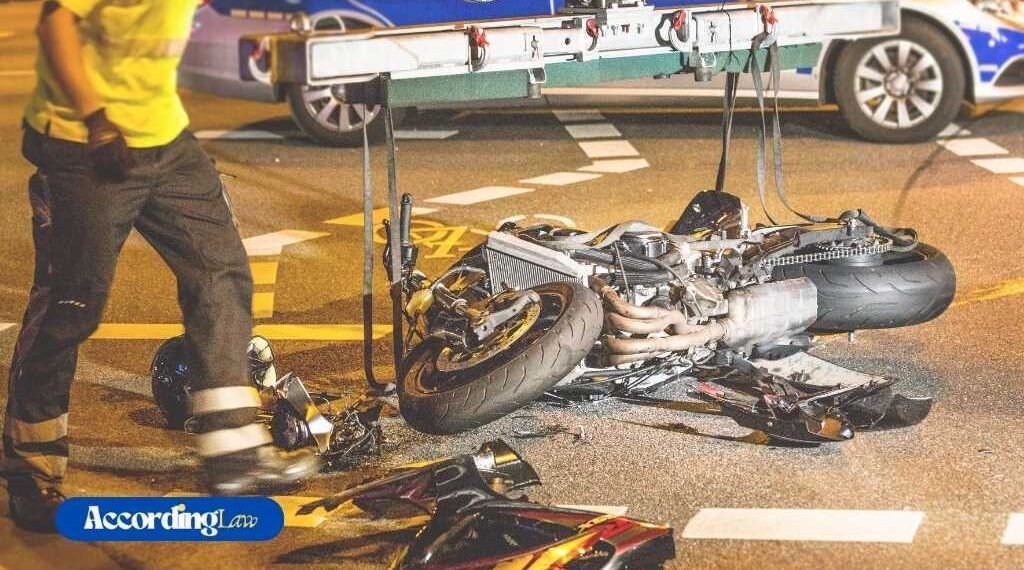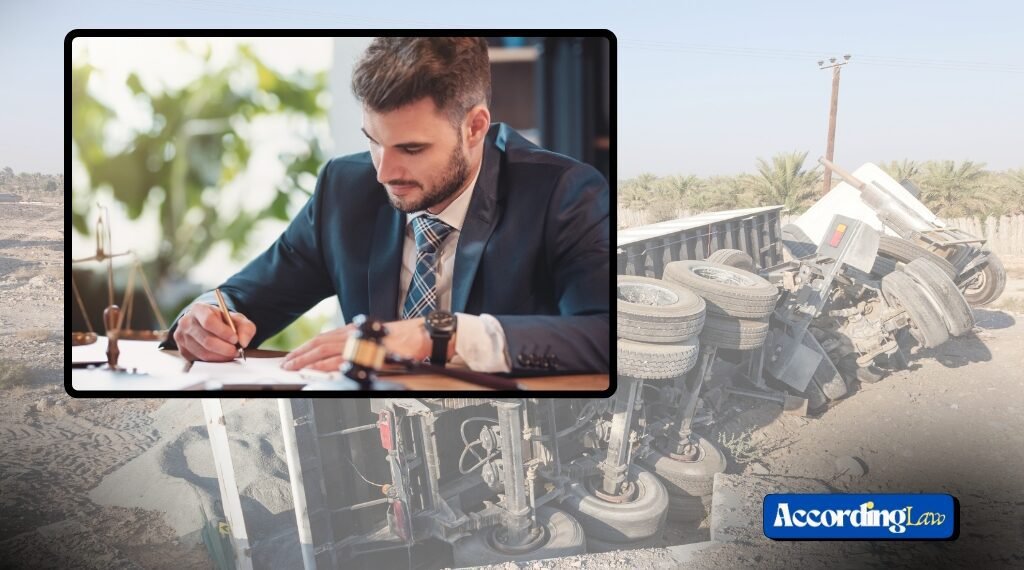Picture this: you’re cruising down the highway on your bike, and suddenly your entire life gets flipped upside down in an instant. One moment you’re enjoying the open road, the next you’re lying on asphalt, wondering what the hell just happened. The reality hits fast, hospital bills start piling up like autumn leaves, insurance companies start playing hardball, and you’re stuck dealing with pain that goes way beyond just physical.
Here’s the thing about motorcycle accidents: they’re not just fender-benders. You’re talking about real consequences that can stick with you for years. And honestly? That’s precisely when you need someone who actually gives a damn about your situation and knows how to navigate the legal maze while you’re trying to put yourself back together.
Table of Contents
Essential Steps After a Motorbike Accident
What you do in those crucial first hours after getting knocked around can literally make or break whether you walk away with fair compensation or get stuck fighting uphill battles for months.
Evidence Collection Strategies That Strengthen Your Case
Witnesses disappear faster than free beer at a barbecue, so grab names and numbers while they’re standing around gawking. Their version of events carries serious weight because they don’t have skin in the game.
Here’s a pro tip most people miss: don’t let anybody move your motorcycle until the cops arrive and document everything. How your bike landed and where the damage occurred tells a story about impact speeds and angles that could save your case.
Halifax, the vibrant capital of Nova Scotia, is known for its bustling streets, scenic coastal routes, and growing motorcycle community. With an increase in traffic and recreational riding, motorbike accidents have unfortunately become more common in the area.
When it comes time to pursue compensation, working with experienced Halifax Personal Injury Lawyers can make all the difference. They know the local roads, the unique risks bikers face, and the tactics insurance companies use to minimize payouts. Having the right legal team ensures your evidence, medical records, and witness statements are leveraged in the strongest way possible.
Immediate Actions at the Accident Scene
Don’t even think about leaving – even if you’re convinced you’re fine. Your body’s probably pumping enough adrenaline to mask a broken bone right now. Get 911 on the phone immediately because you need paramedics checking you out, and you need that official police report documented.
It’s natural to want to explain or apologize after an accident, but it’s best to stay quiet about fault. Even a simple “I’m sorry” can be misinterpreted later. Instead, focus on protecting yourself: take photos of everything, your bike, the other vehicle, skid marks, any hazards like potholes, and visible injuries. Every detail counts, and documenting them thoroughly can make a significant difference if you need to pursue a personal injury claim.
Medical Documentation Requirements for Claims
Here’s where people mess up constantly: they skip the hospital because they feel “okay enough.” Don’t be that person. Adrenaline is nature’s painkiller, and it’s masking injuries that could sideline you for months, internal bleeding, concussions, spine damage that shows up days later.
Follow up with your regular doctor within 48 hours, even if the ER cleared you. Building that medical paper trail becomes your lifeline when insurance companies start questioning whether you’re really hurt or just chasing money. At this stage, consulting personal injury lawyers can also help you understand how to document your injuries in ways that strengthen your claim and prevent insurers from downplaying your condition.
Now that you’ve got the immediate aftermath handled, let’s dig into how this whole legal process actually works.
Understanding the Motorbike Accident Claims Process
The legal world surrounding motorcycle crashes involves more red tape and deadlines than you probably want to think about, but understanding the basics keeps you from getting steamrolled.
Types of Motorcycle Injury Claims You Can File
Personal injury claims tackle your medical expenses, lost paychecks, and compensation for the pain you’re enduring. Property damage claims handle getting your bike fixed or replaced. Here’s a statistic that’ll knock your socks off: 5,932 motorcyclists died in traffic accidents during 2021, the highest number since they started keeping track in 1975.
When accidents turn fatal, wrongful death claims come into play, which involve completely different legal strategies and much tighter timelines.
Comparative Negligence Laws in Motorcycle Accidents
Nova Scotia operates under comparative negligence rules, which basically means you can still collect money even if you screwed up a little bit. If they decide you’re 30% responsible for what happened, you’ll still walk away with 70% of the total damages awarded.
Unfortunately, this system often works against motorcycle riders because people have this unfair assumption that we’re all reckless speed demons looking for trouble.
Timeline and Deadlines for Filing Claims
You’ve generally got two years from your accident date to file a lawsuit in Nova Scotia, but don’t wait that long to report to insurance – they want to hear from you within days or weeks, not months.
Miss these deadlines and it doesn’t matter how bulletproof your case looks – you’re done. Game over. No second chances.
Understanding the process gives you the foundation, but here’s where experienced legal help really shows its worth.
How Personal Injury Lawyers Maximize Your Compensation
Personal injury lawyers do way more than push paperwork around – they transform your documented losses into serious money using strategies and legal knowledge that most people never even knew existed.
Calculating Economic Damages in Motorcycle Accidents
Medical bills stretch far beyond that initial ambulance ride and emergency room visit. We’re talking future surgeries, months of physical therapy, prescription medications, maybe even equipment modifications for your home. Get this, people with legal representation typically receive settlements 3.5 times higher than folks who try going it alone.
Lost wages include not just the time you’ve already missed, but also your reduced earning potential if these injuries affect what kind of work you can handle down the road.
Non-Economic Damages: Pain, Suffering, and Loss of Enjoyment
Pain and suffering compensation addresses the physical agony and emotional trauma you’re dealing with. Loss of enjoyment covers all those activities you used to love but can’t participate in anymore because of your injuries.
These “intangible” damages frequently represent the biggest chunk of motorcycle settlements, but they’re also the trickiest to calculate without someone who knows the system inside and out.
Future Medical Costs and Long-Term Care Considerations
Serious motorcycle injuries don’t just disappear after a few months of healing. Spinal cord damage might require lifetime assistance, while brain injuries often demand extensive rehabilitation that stretches for years.
Smart lawyers collaborate with medical professionals to accurately project these ongoing costs, making sure you don’t get stuck paying out of your own pocket when insurance money runs out.
While understanding compensation helps, several unique challenges can completely derail your claim if you’re not prepared.
Common Challenges in Motorcycle Accident Cases
Motorcycle claims face obstacles that car accident cases never encounter, which means you need specialized legal strategies to overcome deeply ingrained biases and complicated liability questions.
Overcoming Bias Against Motorcyclists
Too many people – including insurance adjusters and potential jurors – automatically assume motorcyclists are irresponsible thrill-seekers who had it coming. This prejudice can slash your compensation even when the other driver clearly caused everything.
Skilled lawyers understand how to present evidence that demolishes these stereotypes and keeps focus on facts instead of unfounded assumptions.
Proving Fault in Complex Multi-Vehicle Accidents
Motorcycle accident compensation cases get messy quickly when multiple vehicles create chain reactions. Figuring out who started the whole disaster requires detailed accident reconstruction and solid witness testimony.
Insurance companies love playing the blame game, and guess who usually gets targeted as the easy scapegoat? The motorcyclist, naturally.
Handling Uninsured or Underinsured Motorist Claims
When the person who hit you doesn’t carry enough insurance coverage, your own policy’s uninsured motorist protection becomes absolutely critical. These claims mean battling your own insurance company, which creates some seriously awkward conflicts of interest.
Most riders have no clue they might be able to stack multiple policies together or that their health insurance could come after any settlement money they receive.
Conquering these common roadblocks demands sophisticated legal tactics that go way beyond standard personal injury approaches.
Working With Personal Injury Lawyers
Choosing the right legal team, personal injury lawyers, becomes essential for identifying and securing every penny you deserve, especially when dealing with maritime law complexities and local court procedures that outsiders simply don’t understand.
Choosing the Right Legal Representation
Hunt for lawyers who specifically focus on motorcycle cases, not general personal injury attorneys who dabble in everything. They grasp the technical aspects of bike mechanics, rider physics, and the particular challenges that motorcyclists face every day.
Ask tough questions about their success record with cases similar to yours and whether they’ve handled claims involving your specific type of injuries.
Understanding Contingency Fee Arrangements
Most personal injury lawyers operate on contingency agreements, meaning you pay nothing unless they actually win your case. They typically claim 30-40% of whatever settlement you receive, but this percentage should drop as your settlement amount climbs higher.
Make absolutely sure you understand which expenses come out of your pocket and exactly when those costs get subtracted from your final settlement.
Communication Expectations During Your Case
Your attorney should keep you informed about developments without making you beg for updates about your own case. They should explain legal jargon in plain English that actually makes sense.
Set clear communication preferences right from the start, some people want detailed email updates while others prefer quick phone calls.
As you assemble your legal team, understanding how to properly manage your financial recovery determines your quality of life moving forward.
Moving Forward After Your Motorcycle Accident
Wrestling with motorcycle injury claims doesn’t have to feel like climbing Mount Everest when you’ve got proper support backing you up. Taking immediate action, documenting everything properly, and securing experienced legal representation creates the foundation for maximum financial recovery. Think about it – insurance companies employ teams of lawyers whose job is minimizing what they pay you. Doesn’t it make sense to have someone equally qualified fighting in your corner?
Your energy should go toward healing and getting back to riding the roads you love, not wrestling with bureaucratic systems specifically designed to frustrate you into accepting less than you deserve.
Common Questions About Motorcycle Accident Claims
Q. Can I still pursue a claim if I skipped wearing a helmet?
Absolutely, you can still file motorbike accident claims, although not wearing protective gear might reduce your compensation under comparative negligence rules if it worsened your injuries.
Q. How long do these settlements usually take?
Most cases wrap up within 6-18 months, but complicated situations involving severe injuries or disputed fault can drag on for 2-3 years before reaching a resolution.
Q. What happens if the other driver fled the scene?
Hit-and-run cases require immediate police reporting and often get pursued through your own uninsured motorist coverage while investigators hunt down the responsible party.


